The Girls in Hiding; A Cafe for Women
In Faizabad, the capital of northeastern Afghanistan’s Badakhshan’s province, a group of girls opened “The Hidden Girls’ Cafe”, a restaurant exclusively for women. In addition to offering local food, the cafe provides a safe space for social interaction between women.
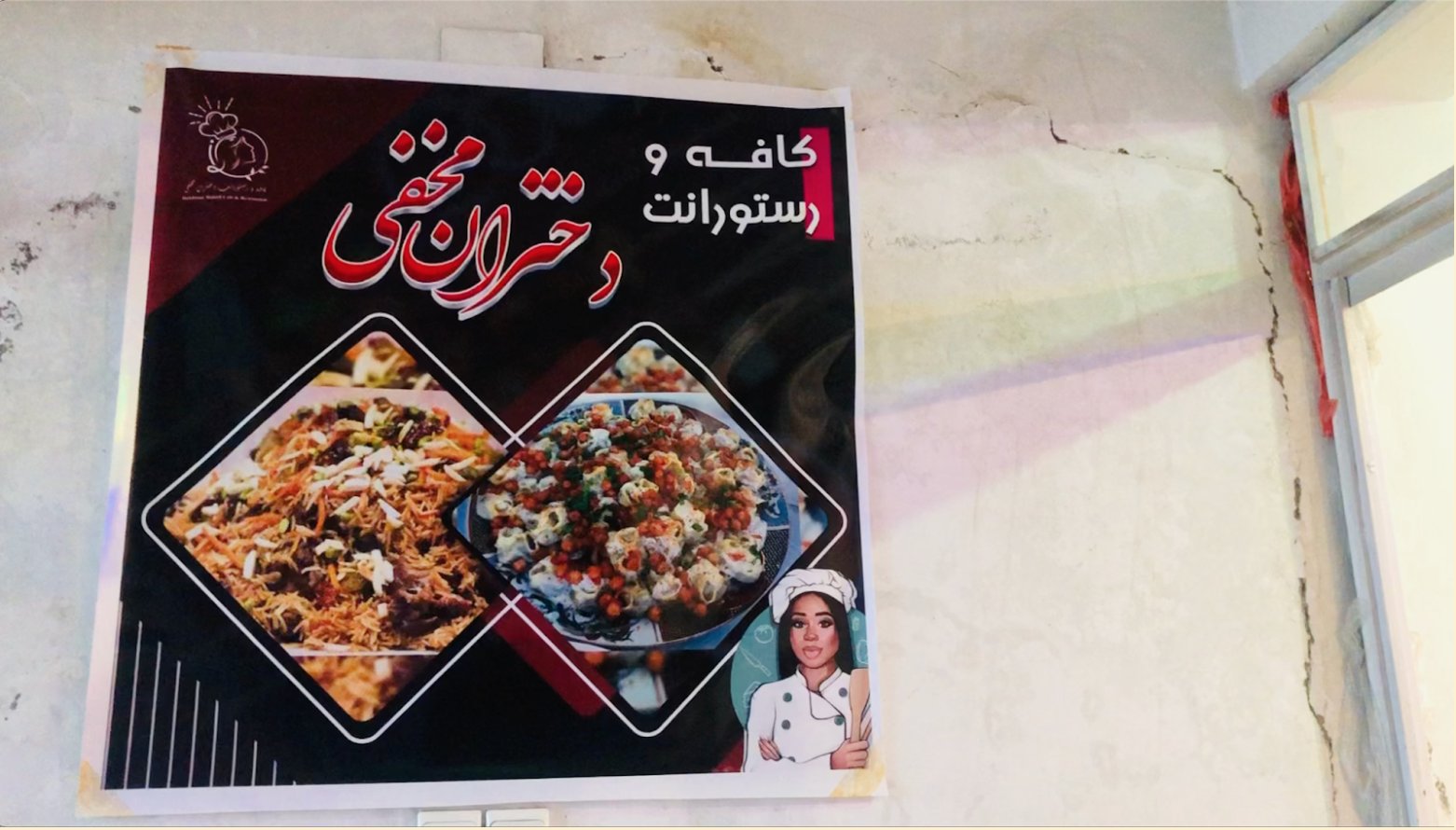
Written by Shabana Farahmand and edited by Abdul Ahad Poya
FAIZABAD, BADAKHSHAN — Restrictions on women, including being barred from working in the public sector, seeking education, and the increasing lack of access to health and social services have significantly impacted women’s lives in a negative way following the Taliban’s victory in Afghanistan in August 2021.
In northeastern Afghanistan’s Badakhshan province, like the rest of Afghanistan, women are forced to wear burqas or scarves covering their faces, with their eyes the only visible part of their face.
In today’s episode of One Day in Afghanistan, Shabana Farahmand visits a local cafe exclusively for women.
Despite the mounting restrictions, Afghan women have embarked on establishing female-owned businesses to contribute to their family and community’s economic well-being. In Faizabad, Badakhshan’s capital, a group of girls opened “The Hidden Girls’ Cafe”, a restaurant exclusively for women. In addition to offering local food, the cafe provides a safe space for social interaction between women. Hidden Girls has become a place of hope in Badakhshan where women and girls work independently and autonomously.
FAIZABAD, BADAKHSHAN — Customers eat and chat while being served at a local cafe in Faizabad, the capital of Afghanistan’s Badakhshan province. Videos by Shabana Farahmand
It's 9 AM, and the sky is overcast. It seems like rain is on the way, and perhaps these clouds will release the sky's pent-up emotions after a long, hot summer. As usual, I gather my reporting tools – pen, notebook, and recorder – and head out towards the Hidden Girls Cafe. I have coordinated my visit with the cafe's manager the day before. The cafe is located in the old city, facing the Minna Bazaar. I hop into a cab and arrive at the destination on time.
Hidden Girls is located in a women-only market. I walk past several stores in the busy market, including a tailoring shop where one woman is tending to a customer while another has her head down and both her hands are holding opposite sides of a piece of cloth running under the sewing machine’s needle. The cafe is at the end of the market, made up of two combined storefronts.
As I close in on the cafe, the alluring smell of food wafting out of the kitchen entices me, encouraging me to enter. I walk through the door, noticing the slightly translucent blue and red curtains hanging from the shop windows pulled shut, cutting the cafe off from the outside world while letting in little light from the outside, lighting the cafe in a blue and red hue as women and girls dressed mostly in black chat with each other throughout the space.
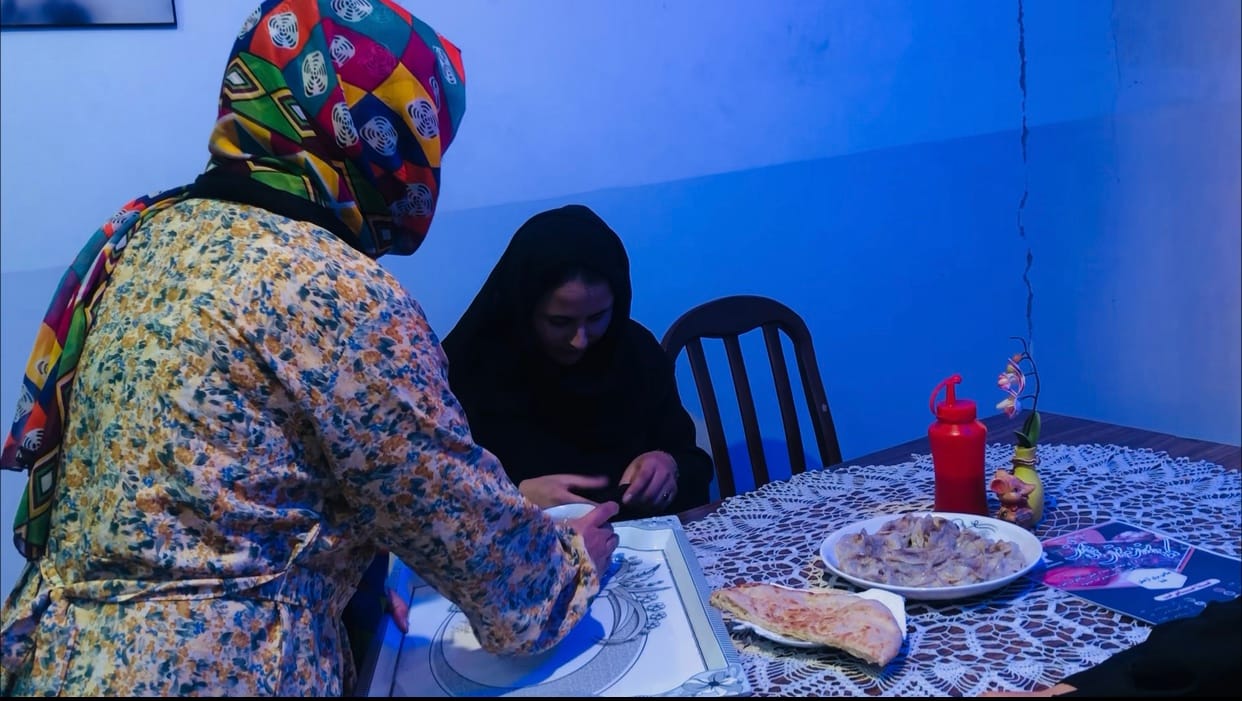
Tables at the relatively small cafe are full, occasionally emptying and refilling as customers walk in and out. Each time a customer leaves their table is almost immediately taken by someone new. The atmosphere in the cafe is extremely cozy and comfortable. Cafe staff treated customers casually to make them feel at ease and give them a sense of familiarity.
A tall girl with fair skin and black eyes standing behind the reception desk smiles at me, beckoning me inside.
“What’s the name of this beautiful princess?” I ask upon getting close to her.
“I am Muzhda, please have a seat,” She responds in a soft tone.
Muzhda Muslim handles accounting for the cafe currently. Ms. Muslim is a high school graduate, she passed the university’s entry exam just before the Taliban took over Afghanistan, and couldn’t continue her education following the group’s ban on women seeking education.
“I took the exam twice, failed the first one, and got through the next. I got admission to study computer science at Badakhshan University but couldn’t continue due to the closure of schools and universities,” Muzhda tells Alive in Afghanistan.
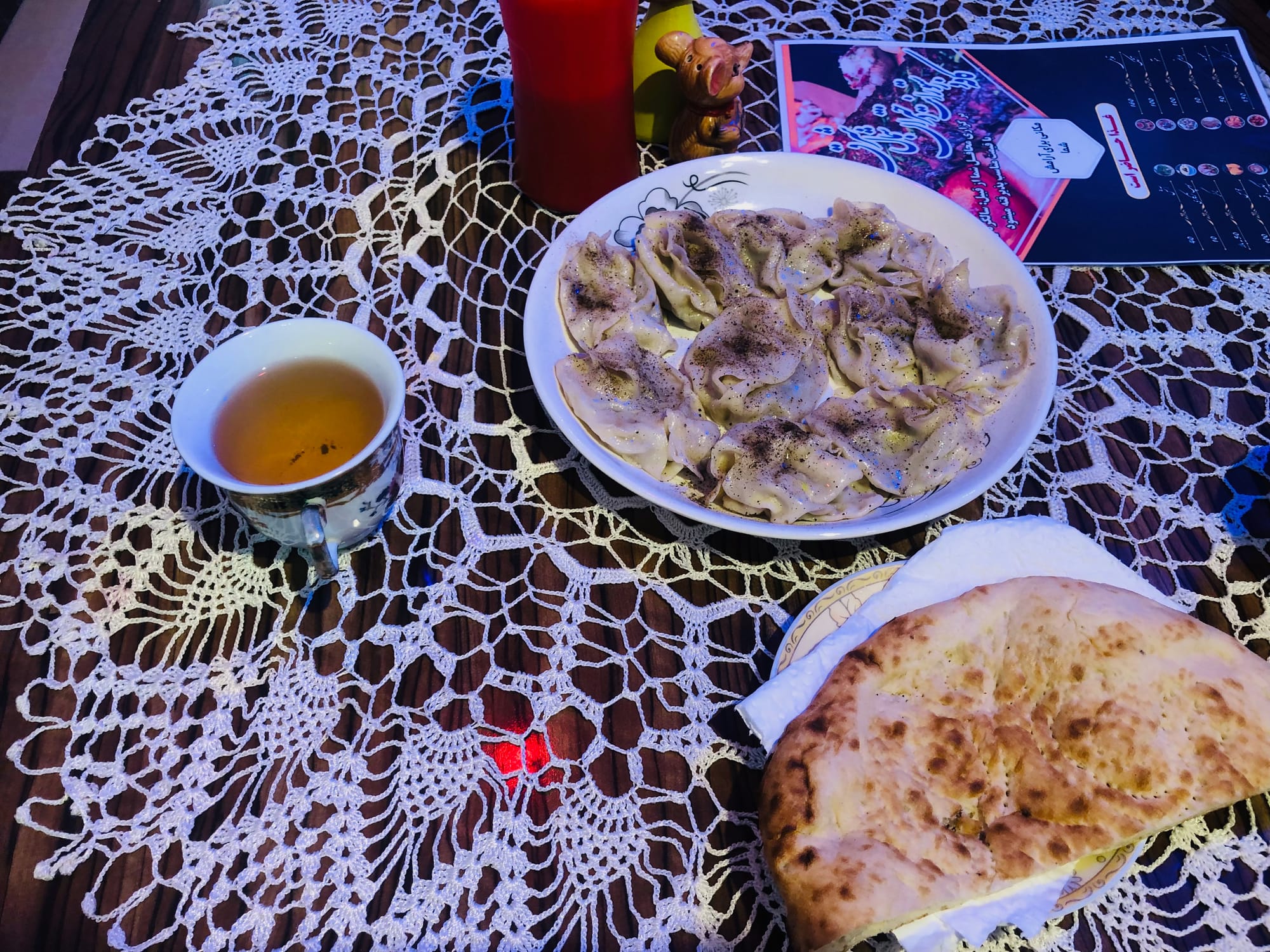
Clearly upset talking about the barriers of access to education, Muzhda says, “I was very distressed hearing the news of the closure. Despair for the future overwhelmed my mind and soul, and I lost hope in everything. I imprisoned myself in a dark room for two months, yes the room was dark, but my faith was darker.”
“I still think the closure of schools and universities is a dream, a harrowing nightmare! I wish it was a dream. But I know it’s not after two years. I would be in my second year at [Badakhshan] University by now. It is extremely painful and terrifying when your fundamental rights become your biggest dream,” Muzhda says.
Seeing as the topic is painful for Muzhda, I enquire about her involvement with the cafe. Muzhda has only worked at the cafe for a month. She works at the cafe from 7 in the morning to 4 in the afternoon, “15 people work in the cafe. All kinds of local food are available here. In addition, customers can book the cafe for events such as birthdays and private gatherings.”
According to Muzhda, the motivation behind the cafe is that “Women can visit the cafe without concern, order food, be served, and relax. We wanted to encourage other entrepreneurs to provide employment opportunities for themselves and other women going through these difficult circumstances.”
Muzhda and I are still engaged in our warm conversation as customers come and go. Although the cafe isn’t very big, tables keep filling up while waiters rush to serve the new patrons.
Seemingly happy with the cafe’s income, Muzhda says, “Daily net income varies depending on customer flow, some days we have a lot of customers while other days are slow. So far, our daily net income is around 3,000 Afghanis, excluding expenses.”
Muzhda states that the cafe has attracted a large number of customers sinc opening, a short amount of time.
“Our only problem is that we have limited space,” Muzhda says.
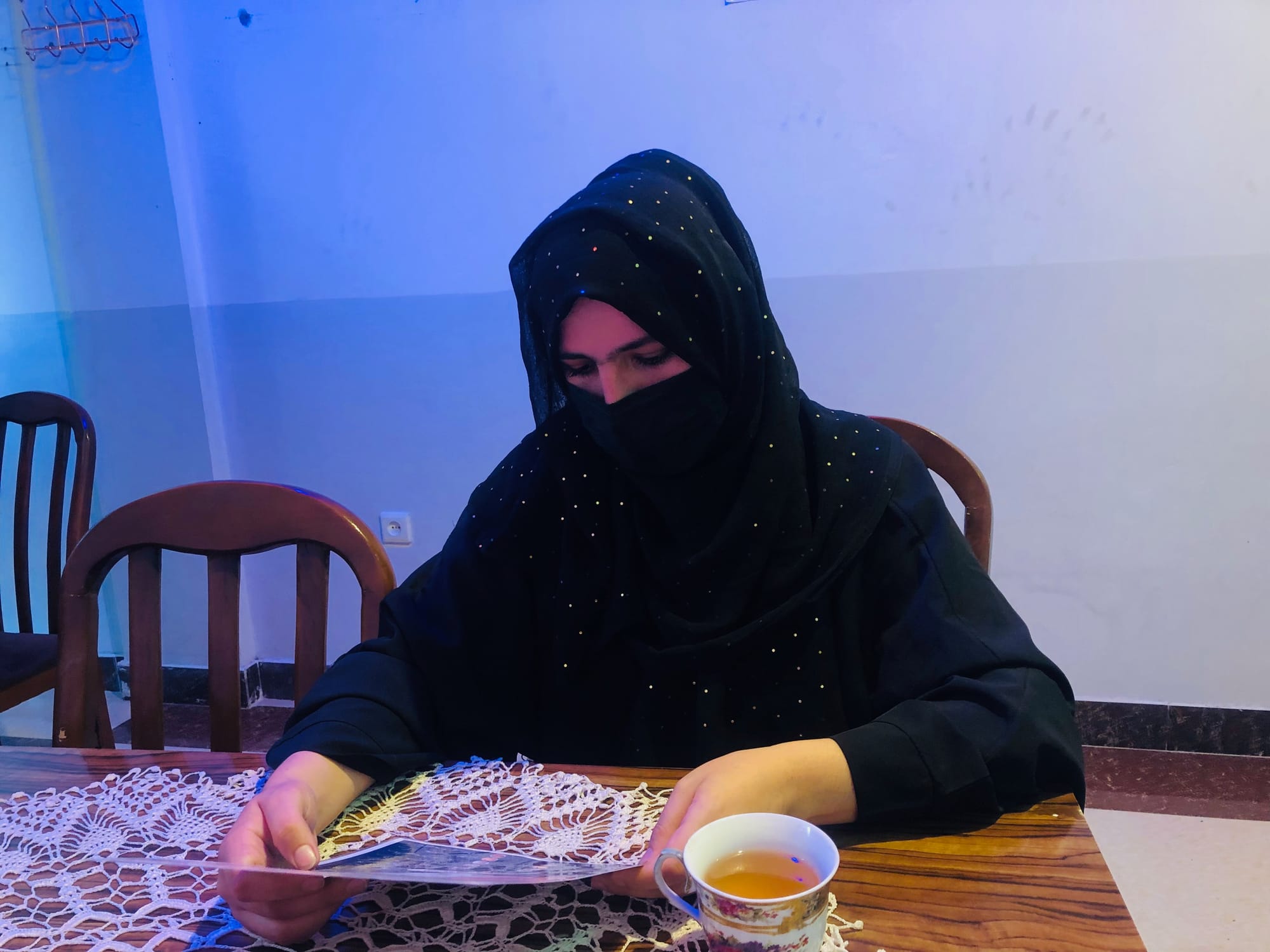
Customers continue coming in and going out, ordering staple foods like Mantu, Ashak, and Bolani. Mantu is a steamed or fried dumpling with seasoned ground beef and onions inside. Ashak is another steamed dumpling with a vegetable filling, mostly Asian leeks. Bolani is a stuffed flatbread that can be fried, grilled in the oven, or cooked over stovetop.
Scanning through the cafe, I notice the simple but elegant tabletop decor that reminds me of my mother’s spread, full of delicious meals made with kindness.
It's now 12 PM. One of the waitresses walks into the dining area holding a large tray of food organized neatly in the tray as she stops by one of the tables. She holds the tray in her left hand while serving with the right. Once finished, I ask if she has a few moments to sit with me.
She is 28 year-old Salma Aziz. Salma has a bachelor’s degree in finance and lives with her family of ten.
“I have been working here for a month,” Salma tells Alive in Afghanistan. Salma used to work at Badakhshan’s Directorate of Finance until the Taliban takeover.
“We opened this cafe to employ women. Girls and women should not stay home and be passive; they must have an active role and presence in society,” Salma says, adding that, “Our staff includes women who are the sole breadwinners of their home, high school graduates who weren’t allowed to study further, and girls who were in their second or third year of university, all staying home, all unemployed previously.”
Talking about the restaurant menu, Salma lists menu items one by one, adding that, “All staff are currently volunteers, working without pay in the early days of the cafe as the exact amount of income and expenses are unknown yet.”
“I would come to work regardless. Staying home and unemployed had totally depressed and discouraged me. I urge domestic and international aid organizations to support women morally and financially so we can pay our staff. We want our staff to come to work with enthusiasm,” Salma says.
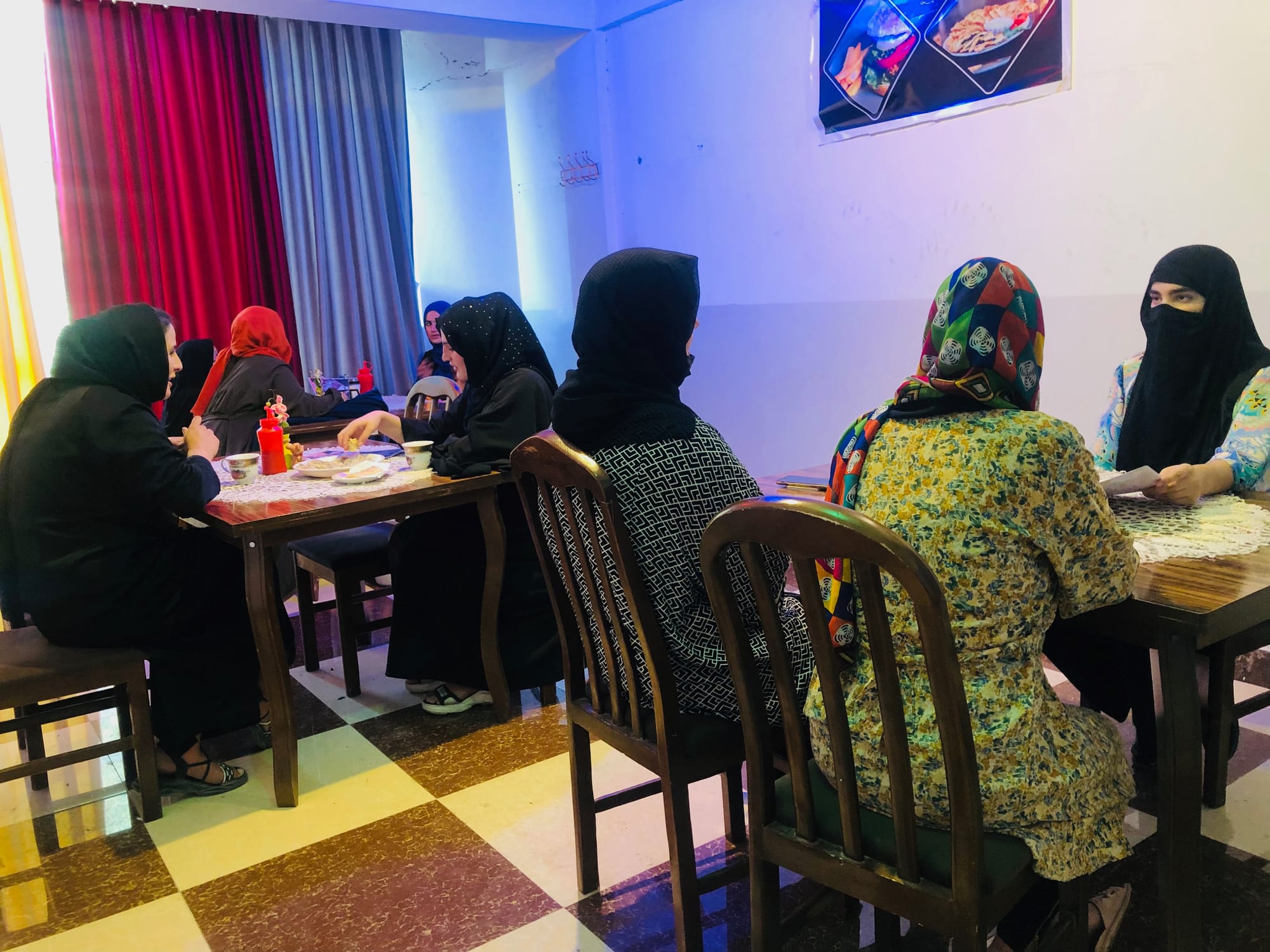
At 1:30 PM, Salma brought over a delicious and favorite national dish, Ashak, with a dal curry to the table for us to share as lunch. Several of my friends who had visited the cafe before had recommended I try Ashak when I visit, they were not wrong. The Ashak I had tasted delicious, nothing like I had before. Salma left after finishing lunch, tending to customers.
I get up from the table we are seated at to go over to another one close to us to speak to some of the customers visiting the cafe. The woman I introduce myself to, Nadia, is a frequent visitor. She is a second-year student studying nursing at a private higher education institute in Badakhshan.
Medicine is the only field women are allowed to study in Afghanistan. Nadia studies in the morning, stopping by the cafe for food on her way home.
“This cafe is truly a beautiful space for women. It’s safe, and clean, and in addition to that, all staff are women. Seeing women begin working again is another great aspect,” Nadia tells Alive in Afghanistan.
Salma joins me at the table again, taking a break from serving her customers. Salma is concerned about the economic situation, which affects the cafe’s development, growth, and success.
“Unemployment and lack of income is one of the challenges we are facing. Higher earnings mean more customers, and lower, means less. Demand is vital in business. Unemployed and low-income families do not go to restaurants. I hope employment opportunities for the public grow so we can improve as well,” Salma says.
Speaking of the cafe’s plans for the future, Salma said the Hidden Girls Cafe has a multitude of future plans, including adding deliveries, online orders, and catering.
Before she leaves to get back to work, Salma urges, “Women must be strong, don’t stay home unemployed and without aim, don’t lose hope! Start doing anything you know, there is nothing you cannot do! Every woman in Badakhshan knows a variety of jobs such as embroidery, sewing, weaving, and more. Start a business with your skill set, and create jobs for other women.”
